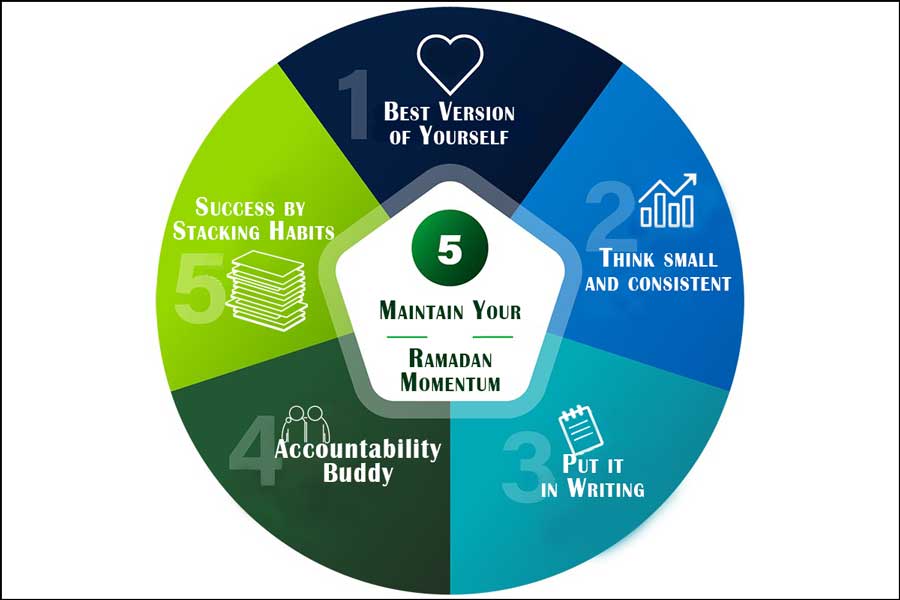Many of us exert ourselves during Ramadan to perform extra acts of worship: we read more Qur’an, give more charity, make more dhikr, offer more prayers, and seek Allah’s forgiveness more often. This is as it should be, since Ramadan is the holiest month when the rewards for our good deeds are multiplied exponentially. Once Ramadan is over, though, it can be easy to fall back into bad habits, get lazy about our ibadah, and neglect the positive routines we had initiated. How can we avoid the post-Ramadan slump?
Here are five strategies that can help us preserve the forward momentum we created in Ramadan and be consistent in our efforts to grow closer to Allah.
- Visualize the best version of yourself. Five years from now, what kind of Muslim do you want to be? What are some of the specific qualities you would like to embody? Which daily habits would the best version of yourself have? Just as important, which actions or bad habits would you eliminate? While you’re visualizing, imagine the Day of Judgment when each and every human will stand in front of the Creator and have their lifetime of deeds placed on a scale. Will your good deeds outweigh your bad ones? Which way will your scale tip? Your eternity depends upon it! Spend some time reflecting on your highest spiritual aspirations for yourself, knowing that your ultimate goal is nothing less than Paradise. Start your endeavor with “Bismillah” and ask Allah to facilitate it for you.
- Think small and consistent. Though you want to aim high, don’t immediately
overwhelm yourself with unattainable goals. You probably won’t be able to do all the things you did during Ramadan throughout the whole year. But that’s okay! The Prophet (peace and blessings be upon him) said, “The most beloved deeds to Allah are the ones that are consistent, even if they are small” (Bukhari).
Think of some extra acts of worship you did this Ramadan that really enhanced your connection to your Creator. Did you pray tahajjud? Did you make a lot of ighstifar? Did you replace mindless entertainment with beneficial Islamic lectures? Whatever you did that made your heart feel closer to Allah, set a concrete goal to continue that habit, but perhaps in smaller increments. Don’t set goals that are too ambitious and overwhelming, or you might not persevere. For instance, maybe you can’t pray tahajjud every single night, but can you commit to doing it every Friday? Perhaps reading ten pages of Qur’an every day isn’t possible, but can you read two? Whatever objectives you set for yourself, make them specific, achievable, and measurable.
- Put it in writing. Now that you know what you want to do, take a pen and paper and
write down your post-Ramadan goals. Why is it important to put them on paper rather
than just thinking about them? “Vividly describing your goals in written form is strongly associated with goal success, and people who very vividly describe or picture their goals are anywhere from 1.2 to 1.4 times more likely to successfully accomplish their goals,” writes Mark Murphy for Forbes. You might want to post your goals in a place where you’ll see them regularly as a reminder of the commitment you’ve made to yourself and to Allah.
- Have an accountability buddy. Pick someone who is supportive of you – like a spouse or
best friend – and tell them about your intentions. Ask them to hold you accountable by asking you periodically how your post-Ramadan progress is going. If you’re falling short, your buddy can remind you of the importance of your quest and give you a pep talk that will get you back on track. - Set yourself up for success by stacking habits. “When it comes to building new habits,” writes James Clear, the author of Atomic Habits, “you can use the connectedness of behavior to your advantage. One of the best ways to build a new habit is to identify a current habit you already do each day and then stack your new behavior on top. This is called habit stacking.
For instance, if you already make dhikr every night before you sleep, then consider stacking the additional behavior of making istighfar 100 times. Or, if you always do a quick check of your appearance right before you head to work, then stack a new habit: make the duaa of the Prophet (s) every time you look in the mirror —“O Allah, just as You have made my external features beautiful, make my character beautiful as well.” Is there a mindless task you do every day, like washing dishes, sitting in traffic, or taking a walk? Try stacking the habit of listening to an Islamic lecture while you do it. You’ll increase your Islamic knowledge while tackling your to-do list.
Wherever you are in your spiritual journey, you can use these five strategies to improve. Whether you are a Muslim who is just beginning to practice, or one who has been Muslim for years, you can customize these strategies to your unique situation. If you consistently add one or two acts of worship to your daily routine with the intention of pleasing Allah, imagine how many rewards you will receive, insha’Allah, and how disciplined you will be when the next Ramadan comes around. You will be on your way to becoming the best version of yourself, and each new Ramadan will then be an opportunity, insha’Allah, to increase your good habits even more and further develop your stamina.
May Allah allow us to continue any progress we’ve made during this Ramadan and live to see another one. May He reward our intentions to grow closer to Him and support us as we strive to be excellent, wholehearted believers. Ameen.






